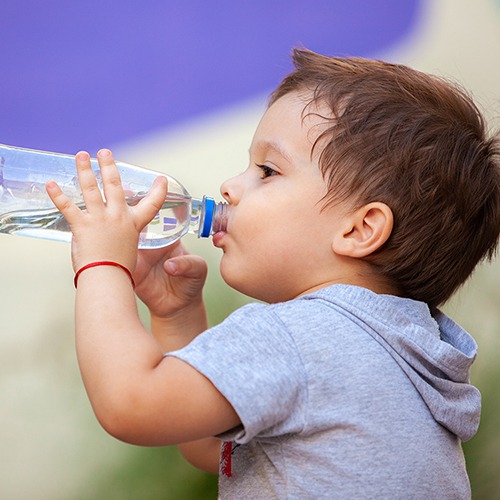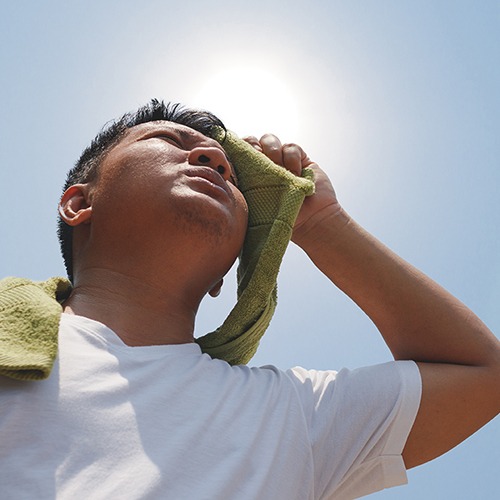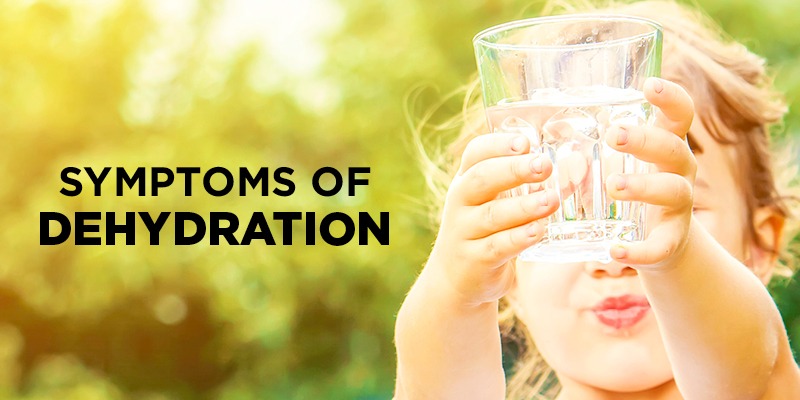While we may have just barely passed the summer solstice, we’re well into the depths of summer here in the Texas Gulf Coast. There’s no other way to put it – it’s HOT out there, and it will be for the next several months. With the heat and humidity only intensifying over the next few months, it’s important to know the symptoms of dehydration, as well as the causes and how to prevent it.
What is dehydration?
Dehydration is a condition that occurs when your body loses more liquid than you take in through drinking and eating. Your body uses water to maintain and carry out normal, day-to-day functions, so not having enough water in your system (dehydration) can lead to serious problems.
Symptoms of dehydration
The symptoms of dehydration can vary, based on age.
Infants and Children:

Dry mouth and tongue

Crying with no tears

No wet diapers for 3 hours or more

Sunken face (eyes and cheeks) and/or soft spot

Sluggishness or irritability
Adults, mild-moderate:

Extreme thirst

Dry or sticky mouth

Headache

Muscle cramps

Infrequent urination

Dark-colored urine
Adults, severe:

Fatigue

Dizziness or fainting

Confusion or irritability

Rapid heartbeat or breathing

Sunken eyes

Very dry skin
It’s important to note that, while listed as a symptom, thirst is not always a reliable sign of dehydration, as many people may not experience thirst until they are already dehydrated. Also, if you’re ill, you may not feel like drinking water because your throat or mouth is sore or you’re sick to your stomach.

What causes dehydration?
Dehydration is caused by a loss of water greater than what is being replaced by drinking or eating. During warm weather, this is often from sweating during outdoor activities and exercise. In especially dry climates, it may be hard to recognize significant sweating, as the sweat dries quickly on your body.
In addition to sweating, dehydration can be caused by illness. Fever, diarrhea, and vomiting can all be causes of dehydration, as well as not consuming enough liquids because of simply not feeling well (upset stomach, sore throat, etc).
Increased urination can also be a cause of dehydration. Frequent urination can be a symptom of diabetes or caused by a urinary tract infection, but can also be the result of certain medications.
How can I prevent dehydration?
Prevention of dehydration under normal circumstances is a matter of ensuring that you are drinking plenty of water and eating foods like fruits and vegetables that have a high water content. For most adults, using the eight 8 oz. glasses a day rule is a good starting place. That guideline will likely need to be adjusted for people who participate in activity that makes them sweat, are outdoors in hot & humid or cold & dry climates, are taking medication that requires additional hydration, or are pregnant or breastfeeding.

Those who are experiencing illness need to increase their fluid consumption as well. Additional fluids should be given at the first signs of illness for diarrhea or vomiting. In addition, older adults are especially at risk of dehydration even during minor illness, as they typically have lower body fluid levels to begin with.
Severe dehydration is an emergency that can lead to serious complications, such as heat stroke, seizure, kidney failure, or hypovolemic shock (a drop in blood pressure caused by lowered blood volume due). If someone is experiencing symptoms of moderate – severe dehydration, you need to seek emergency care. Neighbors Emergency Center can treat dehydration of all severities and in all ages.

